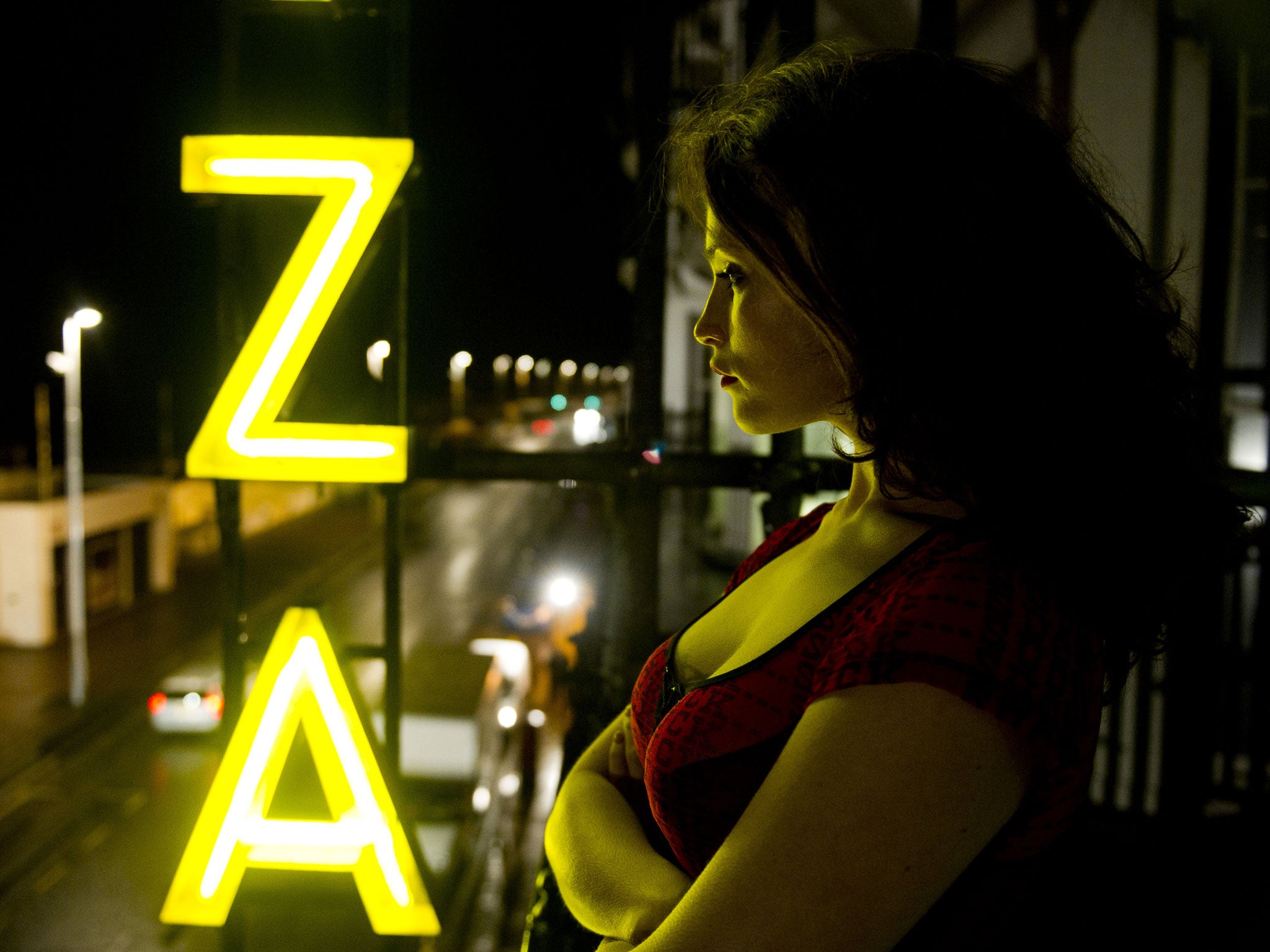Jonathan Romney on Byzantium: Revenge of the British landlady
Neil Jordan nudges self-parody in a garbled feminist vampire-fest set in a seaside B&B

Don't say "vampire", whatever you do. Byzantium may be based on a play called A Vampire Story – by Moira Buffini, who has adapted it for the screen – but the term used is "sucrient". And it's not something you add to your coffee.
Neil Jordan's film features Gemma Arterton as a very succulent sucrient – Clara, more than 200 years old and still making a living as a hooker and lap dancer, which might be considered a little undignified at that age. Byzantium is a tribute partly to Ireland's pioneering Gothic writer Sheridan LeFanu, and partly to the 1970s cycle of Hammer heavers, as you might call them – films about oversexed bosomy vampiresses. There's not much biting in Byzantium – instead of fangs, these vampires attack with a sharp, extendable thumbnail – but there is a great deal of Arterton's aggressive décolleté (in one scene she wears a top with the words SUCK SUCK SUCK printed all over it: nothing like giving the game away).
No less arresting, though, is the impassive stare of Saoirse Ronan as Eleanor, Clara's supposed kid sister. The less Ronan emotes, the more mesmerising she is; I'd love to see her in one of those existential European art films that require a poker face for two hours at a stretch.
It's Ronan's otherworldly deadpan that saves Byzantium from being entirely risible. We first meet her as Eleanor inscribing her memoirs in a florid cursive: "My story can never be told ...." In fact, Eleanor's story is told at some length, and so are further stories within the story, in a properly old-fashioned digressive manner. But Eleanor only gets down to telling it properly once she and Clara have decamped to a desolate seaside town, where they take over a ruined B&B, once a palatial hotel. You can't miss it, there's a huge neon sign that reads BYZANTIUM. It's a touch of the 1980s, when every British art film, however low-budget, revelled in its splash of gratuitous neon, Jordan's more than most. While Clara turns the joint into a desultory brothel – only two staff, apparently, recruited from the local funfair – Eleanor signs up for a creative writing workshop, where she starts fleshing out her backstory.
And what a yarn it is – Regency whorehouses, army officers both caddish (Jonny Lee Miller) and dashing (Sam Riley), parades of bonneted orphans, a waterfall gushing CGI blood … Eleanor's tutor (Tom Hollander) concludes she's some sort of literary genius, but that it still might be a good idea to call Social Services.
But stranger than all this ghoulishness is the boy that Eleanor takes a shine to. I suspect that Frank, a young waiter with leukaemia, was not that peculiar in Buffini's script, but Caleb Landry Jones makes him the oddest thing here. Straggly haired and dressed in thrift-shop waistcoats, the American actor has an inexplicable accent, a repertoire of twitches and contortions, and a raspy delivery that suggests Benicio del Toro impersonating Lee Marvin – backwards. To describe him as distracting is an understatement: Jones now occupies Crispin Glover's position as Weirdest Boy In The Movies.
This is a handsome film, due largely to Sean Bobbitt's photography and its solemnly luscious colour palette. But Byzantium feels like an awkward step back for Jordan, who helped kick-start the current vogue for fang operas in his 1994 Anne Rice adaptation Interview with the Vampire, and before that, effectively brought neo-Gothic to modern art cinema in The Company of Wolves (1984), inspired by Angela Carter's mixing of horror and fairy-tale tropes.
So, all in all, you can't help feeling that Byzantium nudges self-homage, or even self-parody. That wouldn't matter if it were less garbled and frantic. Jordan seems to have forgotten how to keep his actors the right side of pantomime, and Arterton in particular goes through the film swaggering about in lingerie talking in "'Ello, dearie" cockney. It's as if she's playing Nancy in a production of Oliver! that's accidentally had to make do with the wardrobe from The Rocky Horror Show.
The story is ostensibly feminist revisionism, with blood-sucking women triumphing over the men who have oppressed them. But Byzantium feels oddly old-fashioned, suggesting that the only two available roles for women are 19th-century ones – Clara's scarlet woman or Eleanor's Jane Eyre-esque pale-and-interesting waif. Still, either option has to be better than mooning over Robert Pattinson.
Subscribe to Independent Premium to bookmark this article
Want to bookmark your favourite articles and stories to read or reference later? Start your Independent Premium subscription today.

Join our commenting forum
Join thought-provoking conversations, follow other Independent readers and see their replies